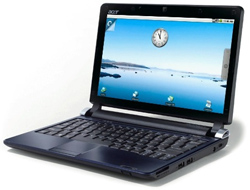Will Chrome netbooks really be competitive?

Acer, which last quarter overtook Dell to become the world's second-largest PC manufacturer, is known as an aggressive company. So it's little surprise that the company's chairman, J.T. Wang, vowed this week that Acer would be first to release a netbook using Google's Chrome OS sometime in the middle of next year. How big a deal this really is remains to be seen.

There's good reason to believe that Chrome OS will be a more formidable challenger. Google is clearly taking the time to make sure that Chrome has the basic performance, security and features that users expect in a netbook by the time it ships sometime in the second half of 2010. And it is working with a broader group of PC manufacturers including not only Acer, but also Asus, HP, Lenovo, Toshiba and, it seems, Dell. Though they are refer to future products as netbooks, Google says it is pushing for slightly larger displays--most likely ranging from 11.6- to 13.3 inches--and full-size keyboards to improve usability, which means they'll probably look similar to the low-cost, ultra-thin laptops that are becoming more prevalent. All of this should add up to a more competitive product.
But Google execs also seem to be downplaying expectations a bit. They've been describing the Chrome OS netbook as a companion product for people that already own one or more PCs, rather than a primary computer. Chrome OS will work only on a limited set of hardware. And most recently, one of Google's lead engineers told CNET that the company is working with printer manufacturers to come up with some way to avoid developing Chrome OS drivers for every printer model on the market--a hint of just how hard it will be to offer broad hardware compatibility.
Despite its flaws, the x86 Windows ecosystem is proving to be very hard to replace. Nokia is just the sort of company you'd expect to release a so-called smartbook that shakes things up, yet it's Booklet 3G uses an Intel Atom processor and runs Windows 7. That's not say Google won't make some headway. By this time next year Acer and others could well have several interesting Chrome OS netbooks on store shelves. In a world filled with near-identical netbooks, it would be nice to have a little variety. But clearly there's a lot of work left to be done on both the software and hardware.